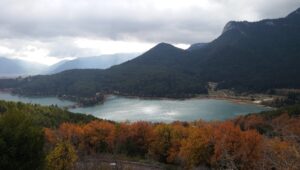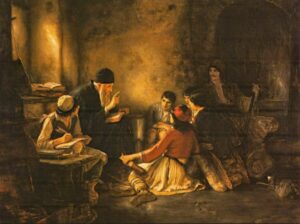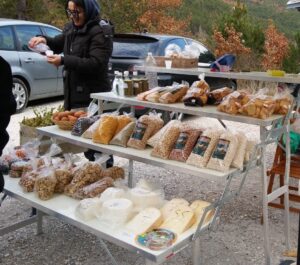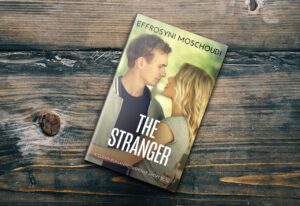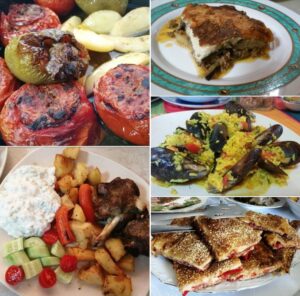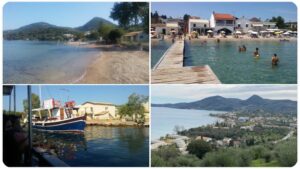This view took my breath away…
My husband, Andy, and I spent one cold Sunday at the end of November filling our minds with images of breathtaking beauty at the mountains and plains of Feneos in Korinthia (i.e. the prefecture of ‘Korinthos’ – Corinth, in English).
I took this photo from the top level balcony of the stunning St George’s Monastery which overlooks Lake Doxa. The monastery of St George was originally built by the lake, but in 1693 the water level rose much too quickly and the monks fled, barely having time to save themselves. The ruins of that monastery are still underwater today. The same year, upon losing their home, the monks got to work building a new monastery high up on the mountain, to make sure history will not not repeated. In the monastery’s garden today, the monks grow a special variety of roses from the Peloponnese that are particularly aromatic.
Once a year, at harvesting season, they get to work using the fragrant flowers to make a syrupy sweet, which they sell at the monastery’s gift shop in jars. They also welcome the guests with a free treat of this sweet, and I can attest to the fact it is highly aromatic and delicious (albeit a little too sweet for my liking). Walking around the charming court of the monastery (that’s decked in stone everywhere you look) and around its different levels and corridors is a pleasure in itself. I was also impressed by the seemingly tireless tour given by an elderly monk. He was such a sweet soul and kept welcoming coachfuls of guests inside the tiny church, sharing about the history of the place in a low soft-spoken voice that rang with kindness and humility.
But, above anything else, for me, the highlight was, by far, my chance to see the tiny nook inside the roof of the monastery that used to serve as a ‘krifo skolio’ (secret school) during the time when Greece was occupied by the Ottoman Empire (1453-1821). To get to the roof, one has to take two short stairs that are more like ladders and thus require a lot of attention. The wood they are made off, and the tiny landing in between, creaked with every step, so guests had to allow up to two people to be up there at a time. Time was precious once you got to the top to admire this precious little space.
The first time, out of respect for everyone waiting below, I took a quick look and felt embarrassed to take out my camera. Luckily, the crowd dispersed later, before it was time to leave on our coach, so I was able to go back up again, my camera in hand this time, to drink in the small space a little better, more reverently as it deserved, and to take a couple of photos. I didn’t go over the high wooden hurdle to venture inside, taking the hint that the place was off limits. 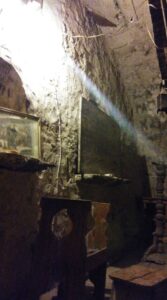
Two elderly men had stepped inside earlier to take a closer look and I thought it was a bit of a naughty thing to do… but also potentially dangerous (creaking floors and all that). But anyway, the photos came out clearer than I’d expected, since the place was deeped in semi-darkness. I love the ray of light captured by the lens, which wasn’t visible with the naked eye. It gives the space that reverence I believe it has. Truly, the ‘krifo skolio’ is romanticised enough in art, just like it is in the famous painting by Nikolaos Gyzis, and it does deserve to be.
After all, every priest and every monk during the Ottoman rule in Greece must have taken it upon themselves to keep the Christian faith and the Greek language alive during those dark 400 years. Had they not decided to organize these meetings in the dark of night to teach Greek children how to read and write in their own language, as well as all about Christian doctrine, chances are the Greeks would not be today the kind of people they are – i.e. people who regard their ancestry something to be proud about and also people that keep God alive in their hearts.
The following stanza from the Greek poet Polemis illustrates the atmosphere of ‘krifo skolio’ perfectly. This is my best effort to translate it into English:
“Outside, black-cloaked desperation
The tangible darkness of a bitter slavery
And inside the vaulted church
The church that every night morphs into a school
The apprehensive light of the oil lamp
Stirs the dreams while trembling
And gathers the little slave children all around.”
When we visited the lake, I quickly turned around to realize my hubbie was nowhere to be found. Crowds had gathered everywhere to admire the local produce on offer that was laid out across many stands along the bank.
I spotted Andy again a little later emerging through the wandering tourist crowds, and he was singing the praises of the locals, saying how hospitable they all were acting. Turned out he’d only gone on a little tour by himself while I was buying all sorts of lentils from the local plains at amazing prices. He was over the moon, having been offered in that short time various kinds of rusks, cheeses and tsipouro to try. I quickly followed his advice and tried some of the samples on offer as well. He was right; it was all delicious. If you’re ever in the area, make sure to try everything. I think we did haha. And we did go away with a couple of big bags. What a saving it all was haha
I’ve already cooked beans and fava and they were both as delicious as they had promised they’d be. I am still to rub the wild oregano I got off the stalks and put it in a jar. That was incredible timing as my longstanding stock of wild oregano from Moraitika, Corfu had recently been depleted 🙂
The lake itself is phenomenally beautiful. I’d love to go back one day and go around it to drink in its beauty at my leisure. In the summer, one can even rent boats (or is it pedalos?). People can cycle along the bank all year round or rent horses and ponies. We only had a short time to enjoy the views as it was quite cold and threatening with rain, but we managed a short walk to the Agios Fanourios church. It is tiny and sits at the end of a long strip of land extending far into the lake.
Our beautiful day out continued with lunch at the village of Feneos – we had roasted lamb, Choriatiki salad, and a side dish of local butter beans in tomato sauce. All enjoyed with fresh bread as we sat by the fireplace. We couldn’t have been taken to a better place for lunch. After all the walking around in the cold, everything hit the spot perfectly.
It’s been almost two weeks since that day and my mind is still full of beautiful images. The colors on the forest trees, the sparkling lake waters, the ancient woodwork and stonework of the monastery, and, last but not least, the sunrays reaching down to the plains as they pierced through dramatic dark clouds. It all helped to take pictures I will cherish forever. This part of Greece is not well known but well worth a visit.
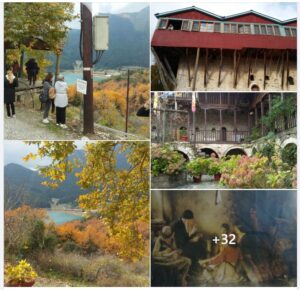
SEE ALL MY PHOTOGRAPHS HERE
OOPPAAA! SIGN UP TO MY BIMONTHLY NEWSLETTER AND GET 3 BOOKS FROM ME AS A WELCOME GIFT! SEE BELOW FOR THIS OFFER!
YOU KNOW WHAT THEY SAY… SHARING IS CARING! Tweet this to spread some love:
Majestic views in Lake Doxa and a secret room in a monastery #Greece #travel #blogger Share on X
3 FREE books for you! Sign up below to receive them instantly!
NEW! Clean Christmas romance. Single mother Cathy Roussos gave up on love long ago, and veterinarian Alex Rallis doesn’t believe in it, but one magical Christmas on a Santorini farm might just change everything…
Check it out on Amazon Read a FREE sample!
A clean romantic suspense short read with an unreliable narrator that’ll keep you guessing! Vera is losing her mind over famous actor Yannnis Ksenos, except, she isn’t just a fan… Now, she plucks up the courage to ring his doorbell… Visit Amazon

